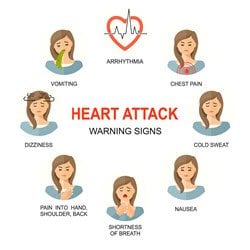911 Basics: Responding to a Heart Attack
 Heart disease is the leading killer in the U.S. Knowing the warning signs of a heart attack and how to respond could save a life. These guidelines can help you make the right decisions and take the right steps when seconds count.
Heart disease is the leading killer in the U.S. Knowing the warning signs of a heart attack and how to respond could save a life. These guidelines can help you make the right decisions and take the right steps when seconds count.
Heart attack symptoms
These may be symptoms of a heart attack. Not all of these warning signs occur in every heart attack. Symptoms can vary based on your gender and age, and if you have diabetes. Seek medical attention right away if any of these symptoms occur:
- Uncomfortable pressure, fullness, squeezing, or pain in the center of the chest that lasts more than a few minutes or goes away and comes back
- Pain spreading to the shoulders, neck, back, jaw, and arms
- Chest discomfort with lightheadedness, fainting, sweating, or nausea
- Shortness of breath with or without chest discomfort
- Feeling very anxious or very tired
- Breaking out in a cold sweat
Men and women may have different symptoms, but according to Jerry Floro MD, a PIH Health Cardiologist, chest pressure or pain is still the most common heart attack symptom for both genders. Women are somewhat more likely than men to have some of the other common symptoms, particularly shortness of breath, nausea/vomiting, and back or jaw pain. Older people may faint, which can be a sign of a heart attack. People with diabetes may not have chest pain at all. Know if you are at risk based on your family history or if you have other major risk factors for heart disease or heart attack.
Be prepared
Take the following emergency actions ahead of time if you or a family member has a heart condition or is at risk of a heart attack:
- Know which hospitals in your area provide 24-hour emergency heart care. Tell family and friends where they are.
- Keep emergency rescue phone numbers near your phone or save them on your cell phone.
- Tell family and friends to call 911 or your local number for emergencies if chest pain lasts more than a few minutes.
There are other causes of chest pain besides a heart attack. But get medical help right away if you or someone else has the heart attack symptoms described above.
What to do
If you suspect someone is having a heart attack:
- Call 911 or your local number for emergencies. Tell the person who answers where you are and that someone is having a heart attack. Don't hang up until you're told to do so.
- Don't let someone who is having symptoms drive themselves to the hospital. If you are having symptoms, don't drive yourself.
While waiting for emergency help to arrive
- Make sure the door to your home is unlocked.
- Make sure you have a phone with you.
- You may be directed to chew and swallow aspirin:
- Don't take aspirin if you are allergic to it, have a known history of bleeding problems, or have other reasons for not taking aspirin.
- Sit in a comfortable chair and wait for help to arrive.